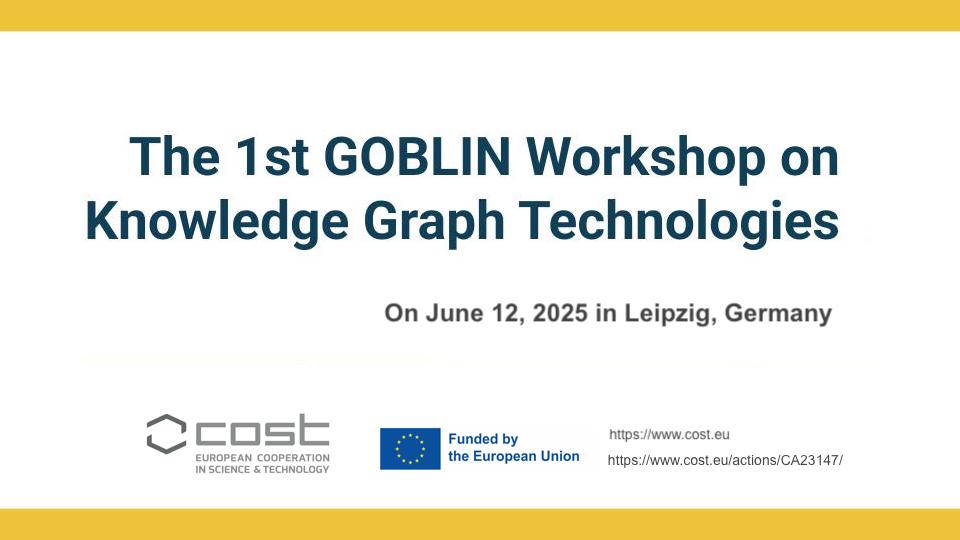We are excited to announce that we will hold the 1st GOBLIN Workshop on Knowledge Graph Technologies on June 12, 2025 in Leipzig, Germany.
Knowledge Graphs are transforming the way we model, integrate, and analyze complex data, with applications spanning various domains, such as finance, health, and robotics, as well as in technologies such as Artificial Intelligence, machine learning, data science, and automation. We invite researchers and industry experts to submit papers to the 1st GOBLIN workshop focusing on cutting-edge developments in Knowledge Graph technologies.
The workshop aims to explore innovations, applications, and challenges in engineering, managing, and utilizing knowledge graphs across various domains. We welcome contributions encompassing methods, tools, applications, datasets, benchmarks, and frameworks, as well as other relevant advances beyond these areas.
The 1st GOBLIN Workshop edition is organized under the umbrella of the GOBLIN COST Action (http://cost.eu/actions/CA23147/). The GOBLIN Action aims to increase and enhance the public open knowledge available in Europe and beyond, by providing a large-scale, high-quality, cross-domain, and multilingual knowledge graph technology that is free to use, reuse, and redistribute.
Keynote Speakers
Prof. Dr. Maribel Acosta (website), Professor of Data Engineering, Technical University of Munich, Germany
Keynote: “Neural Query Optimizers for Knowledge Graphs: Can We Get There?“

Prof. Acosta is a Professor at the Technical University of Munich (TUM), with research expertise spanning Databases, Semantic Web, Knowledge Representation, Data Engineering, and the application of Machine Learning techniques. Her work focuses on developing novel methods for the efficient and effective querying and management of Knowledge Graphs, as well as exploring how Machine Learning can address diverse challenges in this area. Prof. Acosta’s contributions are highly regarded in the fields of Data Management and Artificial Intelligence, and she plays an active role in advancing research at the intersection of these disciplines.
Dr. Felix Sasaki (website), Chief Expert for Knowledge Graph and Semantic Technology to the AI Unit at SAP, Berlin, Germany
Keynote: “AI as driver and beneficiary of enterprise knowledge graphs?“

Dr. Sasaki is Chief Expert for Knowledge Graph and Semantic Technology in the AI Unit at SAP. He is a recognized authority in the fields of Semantic Technologies, Language Technologies, and Knowledge Graphs. Throughout his career, he has made significant contributions to web standards development, particularly at the W3C, with a focus on data interoperability and multilingual information processing. With extensive experience in both research and industry, Dr. Sasaki bridges cutting-edge innovation and practical applications, helping to advance the use of AI and knowledge-based technologies in real-world settings. His work continues to shape the way data is structured, shared, and interpreted across diverse domains.
Workshop Program (ROOM 377)
| 9:00 – 9:10 | Opening & Welcome (slides) Blerina Spahiu and Milan Dojchinovski |
| 9:10 – 9:50 | Keynote on “Neural Query Optimizers for Knowledge Graphs: Can We Get There?” (slides) Chair: Blerina Spahiu Speaker: Prof. Maribel Acosta Technical University of Munich, Germany Abstract: As knowledge graphs are integrated into modern data ecosystems, optimizing queries over them remains a critical challenge. Their complex structure and access patterns strain traditional query optimizers. Recent research has introduced neural components into the query optimization pipeline – mainly targeting tasks such as cardinality estimation – with promising results. In this talk, I survey the landscape of neural and neuro-symbolic query optimization techniques with a focus on their applicability to knowledge graphs. I analyze how learned models can complement or replace classical components, the impact on execution performance, and the trade-offs introduced by data-driven approaches. The talk concludes with a forward-looking discussion on end-to-end neural query optimization – where the entire pipeline is learned – highlighting key challenges such as scalability, reliability, and interpretability. |
| 9:50 – 10:30 | Session I: Knowledge Graphs Enginnering Chair: Blerina Spahiu A Multi-Agent System for Semantic Mapping of Relational Data to Knowledge Graphs Milena Trajanoska, Riste Stojanov and Dimitar Trajanov (full paper) (20+3) (pdf, slides) A Visual Notation for Web-Based Ontology Modeling Julija Ovcinnikova and Karlis Cerans (short paper) (10+3) (pdf, slides) |
| 10:30 – 11:00 | Coffee Break |
| 11:00 – 12:30 | Session II: Knowledge Graphs Enginnering Chair: Milena Trajanoska Bridging the Gap Between Natural Language and Semantic Web: A Text-to-SPARQL System Dimitar Pavlovski and Riste Stojanov (full paper) (20+3) (pdf, slides) An Event-centered Knowledge Graph for Bulgaria Kiril Simov, Nikolay Paev and Petya Osenova (full paper) (20+3) (pdf, slides) AI Agent-Driven Framework for Automated Product Knowledge Graph Construction in E-Commerce Dimitar Peshevski, Riste Stojanov and Dimitar Trajanov (full paper) (20+3) (pdf, slides) Towards Generating Synthetic EHR Knowledge Graphs — a Probabilistic Approach Milos Jovanovik, Eva Milenkova, Maxime Jakubowski and Katja Hose (short paper) (10+3) (pdf, slides) |
| 12:30 – 13:30 | Lunch |
| 13:30 – 14:10 | Keynote on “AI as Driver and Beneficiary of Enterprise Knowledge Graphs” (slides) Chair: Milan Dojchinovski Speaker: Dr. Felix Sasaki Chief Expert for Knowledge Graph and Semantic Technology, AI Unit at SAP Abstract: Enterprise related knowledge graphs have been around for some time, with a low level of adoption. The rise of generative AI has led to growing interest in a new role: Knowledge Graphs for grounding and avoiding hallucinations. In this presentation, we will first touch upon real live use cases for knowledge graphs becoming the glue between enterprise data and natural language. We then analyze the technical and organizational prerequisites for achieving the underlying implementation and reflect on the progress needed for knowledge graph adoption in the enterprise. Finally, we touch upon current opportunities from an enterprise perspective in the realm of various research areas, including agents and knowledge graphs as well as the notion of a semantic layer involving knowledge graphs, data products and foundation models on unstructured or structured data. |
| 14:10 – 15:00 | Session III: Knowledge Graphs Enginnering Chair: Blerina Spahiu Prompting or Fine-tuning? Evaluating Relation Classification in Portuguese for Knowledge Graph Construction Tomás Pinto, Bruno Ferreira, Catarina Silva and Hugo Gonçalo Oliveira (full paper) (20+3) (pdf, slides) LLM-Powered Knowledge Graphs vs Topic Modelling for Sustainable Development Analytics Buket Fildisi, Edlira Vakaj, Amna Dridi and Atif Azad (full paper) (20+3) (pdf, slides) |
| 15:00 – 15:30 | Coffee Break |
| 15:30 – 16:05 | Session IV: Knowledge Graphs & Question Answering Chair: Milan Dojchinovski From LLM Generation to Knowledge Representation: Creating and Structuring the GeminiKnowledge-sr QA Dataset for Serbian Ranka Stanković, Nikola Janković, Jovana Rađenović and Milica Ikonić Nešić (full paper) (20+3) (pdf, slides) The CK25 Corporate Knowledge Reference Dataset for Benchmarking Text 2 SPARQL Question Answering Approaches Sebastian Tramp and René Pietzsch (short paper) (10+3) (pdf, slides) |
| 16:05 – 16:55 | Session V: Knowledge Graphs Use Cases Chair: Milan Dojchinovski Digitizing and Structuring Early Marine Biodiversity Records: A GraphRAG-Based Methodology Gustavo Nuñez, Marcos Zárate, Darío Ceballos and Pablo Fillottrani (short paper, online) (10+3) (pdf, slides) Smart Learning Applications with the combination of the Open Research Knowledge Graph and Teaching Knowledge Graphs Eleni Ilkou and Sören Auer (short paper) (10+3) (pdf, slides) Towards personal data store-based retrieval augmented generation in mobile computing Zachary Grider and Alexander Nelson (full paper) (10+3) (pdf, slides) Can Personal KG-based RAG Empower Patients? Mariana Dias and Carla Teixeira Lopes (short paper) (10+3) (pdf, slides) |
| 16:55 – 17:00 | Closing Remarks (slides) |
Wokshop Topics of Interest
We welcome contributions on the following list of Knowledge Graph topics, but are not limited to:
- Modeling, designing, and integrating KGs, including ontology engineering and enrichment.
- Development, publication, maintaining, and versioning of knowledge graphs, including schema evolution and data updates.
- Techniques for extracting, linking, and improving knowledge graphs, ensuring data quality and consistency.
- Methods for reasoning and discovering insights, patterns, and relationships within large-scale KGs.
- Strategies for safeguarding knowledge graphs, addressing access control, bias detection, and data protection.
- Leveraging KGs in deep learning, large language models, and natural language processing, KGs for LLMs and LLMs for KGs.
- Enhancing search, recommendations, and question-answering systems using knowledge graph-based techniques.
- Success stories and lessons learned in real-world implementations of KGs in healthcare, finance, e-commerce, manufacturing, and beyond.
- Applications of KGs in various contexts, such as content analysis, misinformation detection, and social media insights.
- Evaluation of knowledge graph development tasks based on LLMs/GenAI.
- Knowledge Graph-based retrieval augmented generation (RAG).
Important Dates
- Submission Deadline (extended):
April 27, 2025May 4, 2025 - Notification of Acceptance:
May 11, 2025May 19, 2025 - Camera-ready papers due: June 10, 2025
All deadlines are set for 11:59 pm, Anywhere On Earth time (UTC-12).
Registration
All participants who wish or plan to attend the workshop, either onsite or online, must register by completing the following form.
The registration will open on May 22nd, 2025 and remain open until:
- May 30, 2025 – for onsite participants (i.e. authors of accepted papers)
- June 5th, 2025 – for online participatants
Accepted Papers:
- Smart Learning Applications with the combination of the Open Research Knowledge Graph and Teaching Knowledge Graphs, by Eleni Ilkou and Sören Auer
- A Visual Notation for Web-Based Ontology Modeling, by Julija Ovcinnikova and Karlis Cerans
- LLM-Powered Knowledge Graphs vs Topic Modelling for Sustainable Development Analytics, by Buket Fildisi, Edlira Vakaj, Amna Dridi and Atif Azad
- A Multi-Agent System for Semantic Mapping of Relational Data to Knowledge Graphs, by Milena Trajanoska, Riste Stojanov and Dimitar Trajanov
- Prompting or Fine-tuning? Evaluating Relation Classification in Portuguese for Knowledge Graph Construction, by Tomás Pinto, Bruno Ferreira, Catarina Silva and Hugo Gonçalo Oliveira
- Bridging the Gap Between Natural Language and Semantic Web: A Text-to-SPARQL System, by Dimitar Pavlovski and Riste Stojanov
- Digitizing and Structuring Early Marine Biodiversity Records: A GraphRAG-Based Methodology, by Gustavo Nuñez, Marcos Zárate, Darío Ceballos and Pablo Fillottrani
- From LLM Generation to Knowledge Representation: Creating and Structuring the GeminiKnowledge-sr QA Dataset for Serbian, by Ranka Stanković, Nikola Janković, Jovana Rađenović and Milica Ikonić Nešić
- Towards Generating Synthetic EHR Knowledge Graphs — a Probabilistic Approach, by Milos Jovanovik, Eva Milenkova, Maxime Jakubowski and Katja Hose
- AI Agent-Driven Framework for Automated Product Knowledge Graph Construction in E-Commerce, by Dimitar Peshevski, Riste Stojanov and Dimitar Trajanov
- An Event-centered Knowledge Graph for Bulgaria, by Kiril Simov, Nikolay Paev and Petya Osenova
- Towards personal data store-based retrieval augmented generation in mobile computing, by Zachary Grider and Alexander Nelson
- The CK25 Corporate Knowledge Reference Dataset for Benchmarking Text 2 SPARQL Question Answering Approaches, by Sebastian Tramp and René Pietzsch
- Can Personal KG-based RAG Empower Patients?, by Mariana Dias and Carla Teixeira Lopes
Submission Guidelines
Submissions must be original and should not have been published previously or be under consideration for publication while being reviewed for this workshop.
Workshop papers must be self-contained, in English, and in PDF format in the style of Springer Lecture Notes in Computer Science (https://www.overleaf.com/latex/templates/springer-lecture-notes-in-computer-science/kzwwpvhwnvfj).
The workshop welcomes the following types of submissions:
- Full research papers (4-6 pages + max 2 pages references)
- Short research papers (2-4 pages + 1 page references)
- In Use and Experience papers (2-4 pages + 1 page references)
- Position and Vision papers (2-4 pages + 1 page references)
- System/demo papers (2-4 pages + 1 page references)
All submissions have to be made through the following EasyChair link:
WE NO LONGER ACCEPT SUBMISSIONS
If accepted, you will be invited to present your work in Leipzig, Germany on 12 June, 2025.
Who can submit
The call is open to submissions from everyone.
Members of the GOBLIN COST Action are particularly encouraged to submit their work.
Special consideration is given to young researchers and innovators (under 40 years old) and researchers affiliated with institution(s) in Inclusiveness Target Countries (ITCs)[1], who are strongly encouraged to participate in the workshop.
In the case of closely ranked submissions, preference will be given to those from young researchers and innovators and individuals affiliated with institutions in ITC countries.
Financial support for authors of accepted papers
The GOBLIN COST Action has allocated a budget to cover the travel expenses for authors of the accepted papers. One author per accepted paper can apply for financial support in case they are not covered by other sources. However, the receipt of financial support is not automatic and will be subject to budget availability and COST reimbursement rules. For more, see the COST Annotated Rules (https://www.cost.eu/uploads/2025/02/COST-094-21-V2.0-Annotated-Rules-for-COST-Actions-Level-C.pdf).
Proceedings
The papers will be collected and published on Zenodo and announced and shared on the workshop website and the GOBLIN COST Action website.
Workshop Chairs
- Blerina Spahiu, University of Milano-Bicocca, Italy
- Milan Dojchinovski, InfAI/DBpedia Association, Germany
For any inquiries please reach out to goblin25@easychair.org.
Programe Committee
- Giedre Valunaite Oleskeviciene, Mykolas Romeris University, Lithuania
- Krzysztof Węcel, Poznań University of Economics and Business, Poland
- Verginica Mititelu, Romanian Academy Research Institute for Artificial Intelligence, Romania
- Jorge Gracia, University of Zaragoza, Spain
- Andreas Weiler, ZHAW School of Engineering, Switzerland
- Alsayed Algergawy, University of Passau, Germany
- Slobodan Beliga, University of Rijeka, Croatia
- Eliot Bytyçi, University of Prishtina, Kosovo
- Daniela Gifu, University of Iasi, Romania
- Milos Jovanovik, Vienna University of Technology, Austria
- Olha Kanishcheva, Jena University, Germany
- Dimitris Kontokostas, Medidata Knowledge Graph, Greece
- András Micsik, SZTAKI, Hungary
- Hai Nguyen, University Of South Wales Prifysgol De Cymru, United Kingdom
- Maria Angela Pellegrino, University of Salerno, Italy
- Vayianos Pertsas, Athena, Greece
- Anisa Rula, University of Brescia, Italy
- Ranka Stanković, University Of Belgrade, Serbia
- Andon Tchechmedjiev, Institut Mines-telecom, France
- Dimitar Trajanov, ss. Cyril and Methodius University, Macedonia
- Oleksii Turuta, Kharkiv National University Of Radio Electronics, Ukraine
- Burak Yaprak, Istanbul Ticaret University, Tukey
- Murat Yılmaz, Osmaniye Korkut Ata University, Turkey
- Slavko Žitnik, University of Ljubljana, Slovenia
Local Organiser
- Milan Dojchinovski, InfAI/DBpedia Association, Germany
- Julia Holze, InfAI/DBpedia Association, Germany
Acknowledgment
This workshop is organized upon work from the GOBLIN COST Action: CA23147 – Global Network on Large-Scale, Cross-domain and Multilingual Open Knowledge Graphs (CA23147), supported by COST (European Cooperation in Science and Technology). https://www.cost.eu
[1] Inclusiveness Target Country (ITC) – The current list of ITCs include: Albania, Armenia, Bosnia and Herzegovina, Bulgaria, Cyprus, Czech Republic, Estonia, Croatia, Georgia, Greece, Hungary, Lithuania, Latvia, Malta, Moldova, Montenegro, Poland, Portugal, Romania, Slovenia, Slovakia, Republic of North Macedonia, Republic of Serbia, Türkiye and Ukraine.For more see https://www.cost.eu/about/strategy/excellence-and-inclusiveness/
- Did you consider this information as helpful?
- Yep!Not quite ...

